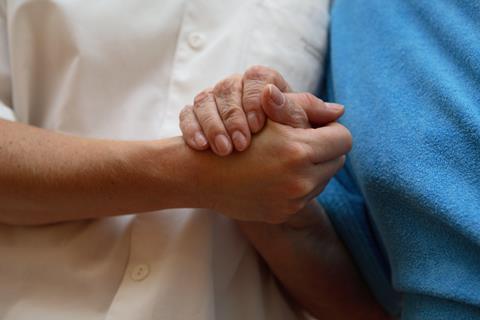To meet the long-term plan’s objective of personalised end-of-life care for everyone, NHS leaders should invest in setting up volunteer services, exhorts Professor Catherine Walshe

Dying in hospital is something that many of us can expect. Nearly half of all deaths currently happen in hospital, but we know that this isn’t always the death that people had hoped for.
Dying in hospital isn’t necessarily a bad thing. We know that many people feel safer in hospital, more supported and cared for.
For others however, it can feel like a scary and lonely place, busy and bustling, with a focus on cure not care. What people want, and how they experience it can change over time, and the support they receive in hospital is likely to be important in shaping what they feel, and how their families feel after their death.
A focus on how people die, and how to support them to die well is, and will remain, important for hospitals. We ignore the experiences of those who die within our hospital walls at our peril.
When we think about hospital care for people who are dying, we probably imagine nursing care, supported by a team of doctors, allied health professionals, and other staff. As a nurse myself, I know how important this team is.
Role of volunteers
We may not necessarily think about the important roles that volunteers can play within hospitals. Volunteers are a mainstay of much hospice and palliative care here in the UK, and there are over 125,000 volunteers contributing to hospice care in a variety of roles.
However, there are far fewer volunteers within the NHS, and even fewer again volunteering with those who are dying. Change, however, is on the way.
It is exciting to see the focus on NHS volunteering spearheaded by Helpforce, an organisation with a mission to bring more volunteers to the NHS. They have now partnered with Marie Curie, the UK charity for people with a terminal illness and their families, with the aim of training more volunteers to support people dying in hospital.
What sort of roles will such volunteers have? It is important that these are shaped by what people need and want, and the needs of the setting they volunteer in.
However, volunteers can and do spend time with people while giving friends and relatives a break. They can provide companionship, and a listening ear.
They can also provide practical support, run errands, and try to ensure the patient has what they need. Volunteers don’t have the complex competing demands on their time that NHS staff have to juggle, and this can mean that they have dedicated time to spend with allocated patients, giving them high quality attention.
Volunteers don’t have the complex competing demands on their time that NHS staff have to juggle… This may free staff to concentrate on more specialised tasks that only they can fulfil
This may free staff to concentrate on more specialised tasks that only they can fulfil, for example providing extra support to those patients who have challenging needs around eating, such as swallowing difficulties.
With growing evidence showing the impact of volunteers’ support on patients, their families and staff, it is now time for senior leaders in the NHS to work with organisations like Helpforce and Marie Curie to build volunteering services that commit to supporting patients with end-of-life care needs.
When people start thinking about investing in volunteers in end-of-life care they can be concerned about risk, personal safety and boundaries. They need to know how best to train and support volunteers, and what roles it is possible and appropriate for them to fulfil.
Our research with volunteers supporting people with life-limiting illness within their own homes shows both that the volunteer service was safely provided, but also that the volunteers had an impact on people’s quality of life. Our research, What is the impact of social action befriending service at the end-of-life?, showed that:
-
More contact with volunteers appears beneficial, with participants telling us that time with a volunteer improved the quality of their life;
-
There was no evidence to show that the time volunteers spent with patients caused any harm;
-
Having volunteers’ support is likely to slow down the rate of decline in quality of life;
-
Participants with certain characteristics may be more likely to benefit. Those who are older, who have cancer, who live alone, and who are male may be more likely to benefit from the befriending/good neighbour intervention.
Challenges
There are many challenges that the NHS needs to take into account. Volunteer services take investment and require training and support to ensure volunteers are prepared to handle sensitive situations.
It’s hard work and doesn’t happen overnight, but with the right tools and support, it is likely to make a difference to dying people and their families.
If senior NHS leaders are interested in setting up such services, they can start with looking into using the Volunteering and End of life care – An evidence based toolkit, where they will be able to access guidance on running a volunteer service for people with end-of-life care needs. (To download the toolkit, click here).
Providing excellent end-of-life care cannot be done by clinical teams only. It is collaborative work where all parties: social care, spiritual, volunteers, hospitals, and families, should come together
It is undeniable that running end-of-life care volunteering services can be challenging, but the benefits that they may bring to patients, families, and NHS staff, could far outweigh any risks.
Providing excellent end-of-life care cannot be done by clinical teams only. It is collaborative work where all parties: social care, spiritual, volunteers, hospitals, and families, should come together.
By recognising the role of volunteers as well as giving them the right support, the NHS can be confident that it is stepping closer to its long-term plan where everyone receives personalised end-of-life care, and organisations like Helpforce and Marie Curie can be part of that plan.




























No comments yet